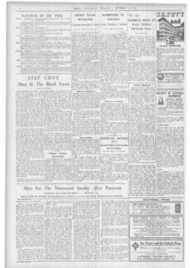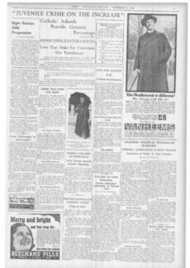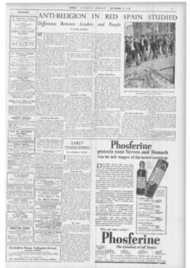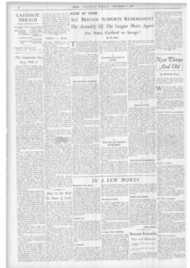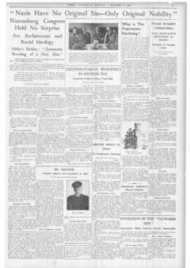Page 11, 17th September 1937
Page 11

Report an error
Noticed an error on this page?If you've noticed an error in this article please click here to report it.
Tags
Share
Related articles
De Valera To Preside Over Geneva " Judgment Day"
Irish News Letter
De Valera And The League To Attend At Geneva Next Month
"lend The League Moral Support" —pleads Ireland's Spokesman
Irish News Letter Ireland's Leader Advocates A World-state
Irish Letter
DE VALERA AND THE LEAGUE OF NATIONS Co-ordination of Church and Sport
From Our Own Correspondent.
DUBLIN.
President de Valera has gone to Genev.a for the session of the League Assembly, which he has attended every year save one, if my memory is not at fault, since 1932, when he came into power, and when he presided at the Council of the League which dealt with the former Sino-Japanese dispute.
The President takes an interest in the League second only to his patriotic interests, and this for two reasons. First, he is devoted to the objects of the League, holding that it represents the same principle in international matters as democracy in national affairs. As he showed in his historic address to the Assembly in 1932 before he surrendered the chair to M. Politis of Greece, in his broadcast on that occasion, and in several later pronouncements, he has no illusions whatever as to the defects of the League and the intentions of many of its other supporters; but, as he said, he believes that everything possible ought to be done to hold it together and to make it effective before we despair of the great experiment in the organisation of the world.
He considers that the nations ought to be ready to pool some part of their sovereignty in a world authority. as men pool part of their personal independence in the authority of the State. Unless this be done there -must remain a world anarchy, modified only by treaties and sectional agreements—a balance of power preserving peace only as long as luck saves humanity from a fresh scramble for domination.
In expounding this case for support of the League, he ranks among that institution most logical defenders, and may be remembered in history as one of those who either saved the League, or struggled to do so before the final resort to a fresh world war.
An Independent Power
Mr. de Valera's second reason for going in person to Geneva year after year is his desire to make Ireland an independent force in world affairs. He considers that our national status is asserted and fortified when the representative of this ancient land takes part in the deliberations of the Powers.
I must add that, in these principles, he is at one with opinion in the Opposition; for Mr, Cosgrave's Government went to similar pains to make Ireland an independent force at Geneva.
It will be remembered, by the way, that the Holy Father personally commended the President for the stand that he took for Christian liberty in his speech at Geneva on the admission of Soviet Russia to the League, and again for his effort to prevent the sanctions against Italy in 1935 from interfering with the interchange of religious objects.
The Church and Gaelic Games
Last week my longish letter was sent too soon to record one of the most inspiriting events of the year—the Hurling final at Killarney.
Records of the game of hurling go back in Ireland to the days of the Ulster epic, nearly a hundred years eke It is the national game out and out, and flourishes in Gaelic Scotland as "Shinty," as a Benedictine writer tells us in a history of the Scottish game. For swiftness, for skill and splendid manhood, it must be the finest sporting spectacle of Europe.
This year's Final, between Kilkenny and Tipperary, received more attention far and wide than any former game—probably because of the lovely venue, Killarney—and English papers sent over notabilities, such as Lord Castlerosse, to describe it, while the Irish Times sent a noted novelist. The Bishop of Kerry welcomed the teams, and the Bishop of Ossory threw in the ball. Then followed a swift and exciting game which was enjoyed by tens of thousands— including 40 special trainloads of people.
Tipperary's young team overcame
Kilkenny's skilled veterans, in a sweeping victory. It is a pity that the occasion did not yield a closer struggle, when the eyes of the world were on the game. The Tipperary team carried back the honours to the county which is after all, the very home of the game; for it is a trifle over 50 years ago that the great Archbishop Croke of Cashel presided at the formation of the Gaelic Athletic Association and the birth of organised national games.
The present Archbishop of Cashel welcomed home the victors to a County as jubilant as ever a county could be, and the "Homes. of Tipperary" all rejoiced.
More than a Cup Final
This event is a great deal more in Irish life than a cup final in another country; for the G.A.A. is recognised as one of the chief national forces, and the revival of Irish games is as dear to us as even the revival of the language. Piolessor Daniel Corkery, in his second book of criticism, takes a hurling final as a symbol of the traditional life—the event which draws all classes truly Irish together, and is attended by prelates and workers, farmers and teachers, gentle and common.
The games are played on Sundays—a long-rooted custom, natural to a rural nation. The big gatherings are " dry," and arc conducted in as orderly a manner as a religious congress, almost. Recognising that the preservation of the national pastimes is of first-rate importance to the people's state, the hierarchy encourages the G.A.A. by patronising the great games. Cardinal MacRory repeatedly has commended the G.A.A.
The Rosary by Radio?
At the close of the " Rural Week " at Ardmore on the Waterford cost, a telegram was read conveying the Pope's blessing to all concerned in the event.
Resolutions were adopted which:— (t) Called un the Athlone broadcasting authorities to wireless the Rosary every night at 11 o'clock—when, by the way, most of us have said it and are in bed and asleep; (2) Urged a State subsidy for poor families working on the land for wages, for every child; (3) Recommended the State publication of rural readers; although the State already has taken too much out of the hands of private educational publishers; (4) Advised that labourers he assured of 2-acre holdings: a splendid proposal; (5) Demanded free cottages for farmers' sons getting married, and State marriage grants to girls of £100; (6) Appealed for action to improve the prices received for farm produce.
Another resolution, specially proposed by Fr. E. Cahill, S.J., the famous writer on Catholic sociology, said : " That it is the conviction of Muinntir na Tire that if the historical Irish nation is to be saved from extinction, and if the fatal drift from the land is to he checked and the present ominous depopulation of the countryside to be reversed, an essential condition will be a reform of the present educational system and the adoption of that system to the needs and interests of a mainly Catholic: and agricultural population."
The last paper read was given by Very Rev. A. M. Crafts, O.P. (whose excellent book on Catholic Social Action was reviewed in the Catholic Herald some months ago), and dealt with the "Seven deadly sins of Irish rural iife"; namely, ignorance, apathy, selfishness, snobbery, meanness, mistrust and politics.
Father Crofts commended the plan of the organisation to form rural guilds on the model of those of the Middle Ages, and a beginning was made then and there by the 1 formation of one of the farmers and labourers of Ardmore under the presidency of the Parish Priest.
Flight from the Farm
Muinntir na Tire will hold a private conference of leaders in about six weeks' time in order to adopt a definite policy and constitution. If only it will lay down a practical programme for the attainment of a Distributive Slate based on rural Ireland, with urban developments in harmony with rural interests, it may go far to rescue the countryside from its present stage of haemorrhage.
The harvest is good, and we are being blessed with splendid weather; but, if we had the broken weather of other years; the harvest hardly could be saved, for sheer lack of workers. A couple of weeks ago, I explained the reduced acreage under wheat by the bad spring, which made it hard to get crops sowed. Discussion with farmers in different parts of the counry have shown me that a more telling cause was the shortage of labour—that shortage which is making the harvest so slow and painful.
The Worst Blow of All The rush of workers from the countryside to employment in the British nrunilions boom is the worst blow to our tillage policy that could be suffered at this stage. I fear that nest year will see yet smaller acreage under crops unless something is done to restore the rural morale.
When the lads see no prospect of marriage and a home of their own on rural Irish conditions—the girl factories have destroyed that hope in large areas—they naturally are attracted by the big English wages, with the prospect of settling down in the cities. So away they'll go until recent tendencies are stopped, One measure I would urge upon our rulers is that a census of rural workers should be taken every summer when the Guards go round and take statistics of the crops and livestock. We hear every year how many hens are in the country, but not how many hen-keepers. An extra column on the census paper would tell us how the human part of the countryside is increasing or diminishing; and this year, God help us, it would reveal a terrible desolation in big areas—the areas which matter most to the historic nation.
No Christmas Parcels
Labour is much gratified by the news that we will get no parcels and greeting cards by post next Christmas Day. The Department of Posts and Telegraphs has notified the Labour chief, Mr. W, Norton, T.D., of agreement with the Labour demand to suspend all postal services on December 25 and 26 for an experimental period of three years. Merry Christmas to the postmen!
Irish-Speaking Brothers
The Archbishop of Dublin has consented to the establishment of another community of the Christian Brothers in Dub lin. An all Irish-speaking community will take up residence in the old Gaelic League premises in Parnell Square—that historic old Georgian house and will conduct a school in which all subjects will be taught through Irish.
The subjects will include Latin, French, mathematics, history geography and music. An exception to the Gaelic rule will be English. which will be taught by the direct method through itself.
3,000 Pilgrims for Lourdes
On Monday, some 3,000 pilgrims left Ireland for Lourdes, headed by Cardinal MacRory and the Bishops of Dromore, Down-and-Connor, Meath, and Clogher, and the Bishop-elect of Kilmore. There were about 150 clergy and 300 invalids. Major-General Brennan of the Irish Army, being in Switzerland at manceuvres, joined the pilgrims in Paris and is heading units of soldiers in transportation of the sick.
Most of the pilgrims sailed from Dun Laoghaire, but some 400 from Belfast. The Knights of St. Columbanus provided motor transport to the ships.
This is the fifth Irish National Pilgrimage to Lourdes.
blog comments powered by Disqus



